|
|
|
Sort Order |
|
|
|
Items / Page
|
|
|
|
|
|
|
| Srl | Item |
| 1 |
ID:
112875
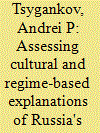

|
|
|
|
|
| Publication |
2012.
|
| Summary/Abstract |
Scholars disagree on how to interpret Russia's assertive foreign policy. According to some observers, Russia's authoritarian culture and political system have historically required the Kremlin to depend on the Western threat image at home and to engage in revisionist behaviour abroad. These observers recommend that Western nations abstain from engaging Russia as an equal contributor to shaping the global system. This article assesses the validity of the authoritarian expansionism theory by comparing it to other prominent perspectives on foreign policy, realism and constructivism. The article argues that, by perceiving Russia's historical and institutional distinctness as fundamentally threatening to the West, the theory overlooks important sources of foreign policy contestation at home and potentially varying directions abroad. The article selects the historically important cases of the Crimean War, the Cold War and the Russia-Georgia War to demonstrate the theory's flaws and to highlight the role of factors other than Russia's authoritarianism in the nation's foreign policy.
|
|
|
|
|
|
|
|
|
|
|
|
|
|
|
|
| 2 |
ID:
130921
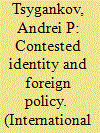

|
|
|
|
|
| Publication |
2014.
|
| Summary/Abstract |
This paper develops a framework for interpreting state international policy by treating national identity as inherently contested. Building on insights from constructivist literature, it proposes a technique for establishing the meaning of foreign policy action on several interrelated levels: state-based, society-based, and international. The paper illustrates the benefits of the approach by selecting the example of Russia's European diplomacy under President Dmitri Medvedev. By studying how officials themselves justify their policies and how these policies are then perceived in broader social and international settings, we have an opportunity to develop a rich understanding of a particular state action, as well as tentatively assess the chances of this action's success or failure.
|
|
|
|
|
|
|
|
|
|
|
|
|
|
|
|
| 3 |
ID:
091483


|
|
|
|
|
| Publication |
2009.
|
| Summary/Abstract |
The paper explores a shift from engagement to confrontation in Russia's policy toward Georgia since the Rose Revolution. In addition to emphasizing power and security as explanations of Russia's behavior, the paper focuses on considerations of honor and prestige. The latter are relational and a product of Russia's perception of its ties with Western nations. Honor also plays a crucial role in Georgia's attitude toward its northern neighbor, and the entire Caucasus area emerges as a battleground for symbolic attributes of power among larger states with capabilities to influence the region. The case of Russia-Georgia divide is important for demonstrating benefits and limitations of traditional foreign policy explanations and for learning possible ways to de-escalate dangerous bilateral conflicts.
|
|
|
|
|
|
|
|
|
|
|
|
|
|
|
|
| 4 |
ID:
080450


|
|
|
|
|
| Publication |
2007.
|
| Summary/Abstract |
Civilisations are imagined, ratherm than real, and nations undergoing identity crises typically represent themselves through multiple civilisational visions. Scholars of geopolitics can hardly understand foreign policy without analysing those visions and social contexts, in which they rise and fall. This article selects for analysis three distinct civilisational ideas of Russia - "West," "Eurasia" and "Euro-East" - associated with Boris Yeltsin, Yevgeni Primakov and Vladimir Putin, respectively. Russia's foreign policy is best understood as reflecting those civilisational ideas rather than merely material power conditions
|
|
|
|
|
|
|
|
|
|
|
|
|
|
|
|
| 5 |
ID:
165653


|
|
|
|
|
| Summary/Abstract |
The world entered the era of change no later than the second half of the 2000s; however, analysts still lack a common understanding of the conditions that surrounded the disintegration of the former world order as well as of the processes, horizons and results of the transition to a new global order. This article discusses what exactly is in store for Russia and when—a growing global disorder caused by the collapse of international institutions created after World War II, the preservation of American domination, or something else? It was the United States that started revising the world order; therefore, Russia’s behavior can be considered revisionist only in relation to Washington’s revisionist strategy imposed on it. The current post-Washington world transition is analyzed here in the context of theoretical studies concerning the previous post-Vienna, post-Paris, post-Versailles and post-Yalta transitions and their historical experience.
|
|
|
|
|
|
|
|
|
|
|
|
|
|
|
|
| 6 |
ID:
172935


|
|
|
| 7 |
ID:
186777


|
|
|
| 8 |
ID:
154384
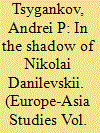

|
|
|
|
|
| Summary/Abstract |
In order to contribute to our understanding of Russian geopolitical theory, this article investigates closely the figure of Nikolai Danilevskii. The article pays special attention to the thinker’s increased influence on contemporary Russian geopolitical thought, by presenting qualitative and quantitative evidence of this influence. It explains Danilevskii’s rise by looking at Western pressures on Russia and the country’s internal vulnerabilities. Such vulnerabilities emerged from the breakup of the Tsarist and the Soviet state, respectively, by providing the required context for the emergence of defensive nationalist ideas.
|
|
|
|
|
|
|
|
|
|
|
|
|
|
|
|
| 9 |
ID:
125344


|
|
|
|
|
| Publication |
2013.
|
| Summary/Abstract |
Faced with external competition, the Kremlin is preoccupied with reviving internal foundations for Russia's soft power appeal." Second in a series on soft power around the world.
|
|
|
|
|
|
|
|
|
|
|
|
|
|
|
|
| 10 |
ID:
101383


|
|
|
|
|
| Publication |
2010.
|
| Summary/Abstract |
In an attempt to broaden our perspective on IR theory formation, this article seeks to highlight the significance of ideology. Consistent with the recently revived sociology of knowledge tradition in international studies, we view IR scholarship as grounded in certain social and ideological conditions. Although some scholars have studied the political, ideological, and epistemological biases of Western, particularly American, civilization, in order to achieve a better understanding of global patterns of knowledge formation it is important to look at cases beyond the West. We therefore look at the formation of IR knowledge in Russia, and we argue that the development of a Russian theory of international relations responds to the old debate on the 'Russian idea,' and three distinct ideological traditions that had been introduced to the national discourse in the mid-19th century. Focusing on theories and concepts of the international system, regional order, and foreign policy, as developed by Russian scholars, we attempt to demonstrate how they are shaped by ideological and therefore pre-theoretical assumptions about social reality.
|
|
|
|
|
|
|
|
|
|
|
|
|
|
|
|
| 11 |
ID:
067860


|
|
|
| 12 |
ID:
073662


|
|
|
|
|
| Publication |
2006.
|
| Summary/Abstract |
Contrary to the increasingly popular image of Russia as an aggressive, imperialist state, the primary drivers in Russia's foreign policy are domestic. They include new economic confidence, new soft power, and remaining security vulnerabilities. In response to these conditions, Russia pursues opportunities for economic growth and stability, and it builds strategic alliances in the near and distant abroad in order to address increasing security threats. The often-used comparison of Russia's foreign policy assertiveness to the Soviet Cold War policy is inaccurate. A better parallel is to Russia's 1890s policy led by Finance Minister Sergei Witte: strong internal economic development through state-driven liberalization, while avoiding foreign policy adventures. The United States should follow a policy of pragmatic substantive engagement, rather than neo-containment, toward Russia.
|
|
|
|
|
|
|
|
|
|
|
|
|
|
|
|
| 13 |
ID:
178808
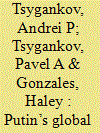

|
|
|
|
|
| Summary/Abstract |
Despite the reputation of being objective and non-partisan, experts
frequently validate concepts and ideas popular within the dominant elite
circles. To support this argument, we have taken a closer look into the
Atlantic Council (AC), an American think tank with clear preferences for the
U.S.-centered international order and NATO as the foundation of security in
Europe. We argue that these preferences have translated into anti-Russian
bias in AC publications. This is evident in the organization’s reliance on
the concept of global hybrid war in describing goals and means of Russian
foreign policy since 2014. We base our analysis on a sample of articles on
Russia and “hybrid war” published by the AC’s experts between 2014 and
2020. In establishing the AC’s pro-NATO and anti-Russian biases, we analyze
the articles’ frames as well as the political and institutional preferences held
by the organization.
|
|
|
|
|
|
|
|
|
|
|
|
|
|
|
|
| 14 |
ID:
113906
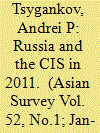

|
|
|
|
|
| Publication |
2012.
|
| Summary/Abstract |
During 2011, Russia made progress in recovering from the global financial crisis and moved toward further political centralization. Moscow also continued to prepare for an uncertain new world by pursuing pragmatic relations with Western and non-Western powers and by seeking to increase its influence among the states of the Commonwealth of Independent States.
|
|
|
|
|
|
|
|
|
|
|
|
|
|
|
|
| 15 |
ID:
145902
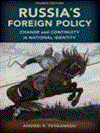

|
|
|
|
|
| Edition |
4th ed.
|
| Publication |
Lanham, Rowman and Littlefield, 2016.
|
| Description |
xxx, 305p.: tablespbk
|
| Standard Number |
9781442254022
|
|
|
|
|
|
|
|
|
|
|
|
Copies: C:1/I:0,R:0,Q:0
Circulation
| Accession# | Call# | Current Location | Status | Policy | Location |
| 058711 | 327.47/TSY 058711 | Main | On Shelf | General | |
|
|
|
|
| 16 |
ID:
164260


|
|
|
| 17 |
ID:
137048
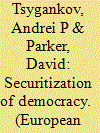

|
|
|
|
|
| Summary/Abstract |
This article explores the claims of Russian officials that US assessments of economic and political developments in Russia, particularly those of Freedom House (FH), are excessively critical and often used to justify global dominance. To assess the validity of such claims, three different influences are considered: culture, power, and special interests. The article finds that all three, each with roots in the cold war, play a role in shaping assessments of Russia and help to explain why FH's analysis of Russia is more critical than the analysis of other organizations. The politics of special interests is found to be particularly influential and reflects the interests of US national security policies and priorities. Such priorities are also linked to a politics of memory derived from the cold war, which often influences perceptions of Russia as a threat rather than as a potential partner.
|
|
|
|
|
|
|
|
|
|
|
|
|
|
|
|
| 18 |
ID:
085583


|
|
|
|
|
| Publication |
2008.
|
| Summary/Abstract |
One important critique of the "West's" hegemony in international relations (IR) theory has been this theory's inability to come to terms with the problem of difference or the Self/Other dialectic. To further highlight the importance of the Self/Other relations, this article proposes to analyze Russian theoretical discourse of relating to Europe and the West. For centuries, Russia has participated in intense interactions among European, Asian and Middle Eastern regions, and it has developed a language and theories for relating to its various Others. Studying Russian debates can assist us in the task of reflecting on problematic epistemological and ethical assumptions behind IR scholarship, as well as suggest some paths to a genuinely diverse and global IR theory.
|
|
|
|
|
|
|
|
|
|
|
|
|
|
|
|
|
|
|
|
|